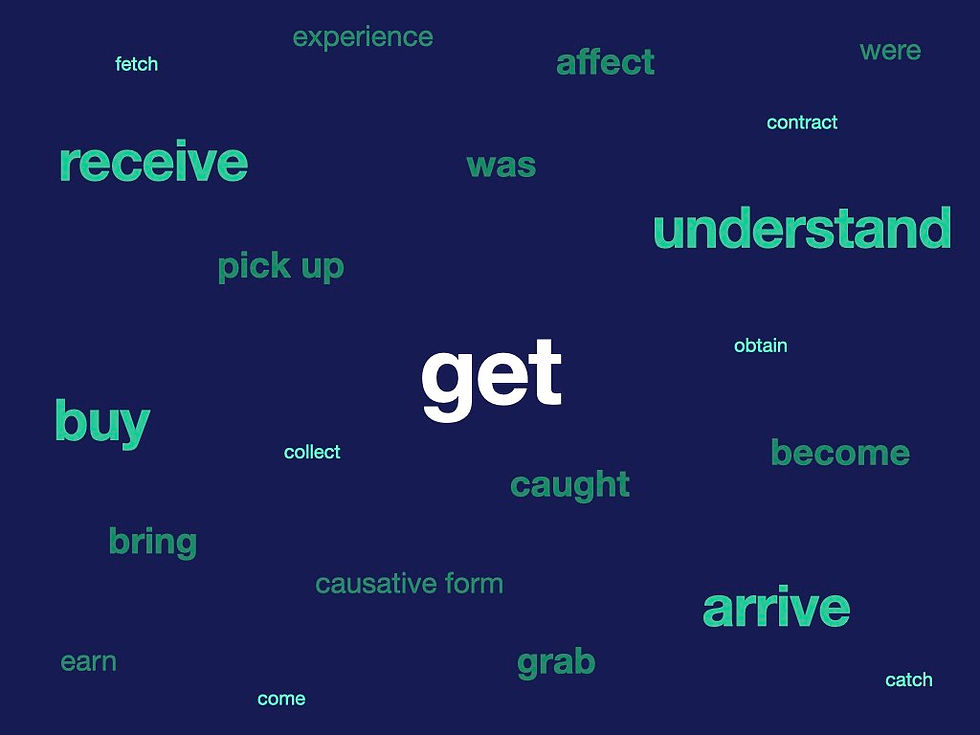Los múltiples significados de «get» en inglés: ¡un verbo, tantos usos!
- Thomas

- 2 jul 2025
- 3 Min. de lectura
Actualizado: 15 ago 2025

Algunos de mis alumnos de inglés han notado algo extraño últimamente: el verbo «get» está por todas partes. Los hablantes nativos de inglés, como yo, usamos «get» en muchas de nuestras oraciones, pero ¿qué significa realmente? ¿Es diferente cada vez? ¿Cuándo no se puede usar?
Sometimes 'get' can mean "arrive," sometimes "receive," sometimes "understand" and sometimes "become." Other times 'get' can replace a more specific verb entirely.
De hecho, «get» es uno de los verbos más versátiles e informales del inglés. En el lenguaje coloquial, a menudo sustituye a verbos más específicos, a veces para que suene más natural y otras veces simplemente por costumbre.
Veamos los principales usos de «get», qué significan realmente y cuándo es adecuado utilizarlos. ¡No olvides poner a prueba tus conocimientos con el minicuestionario que encontrarás más abajo!
Los múltiples significados de «get»:
1. Get = Receive (Recibir) / Obtain (Obtener) / Buy (Comprar)
Ejemplos:
I got a package in the mail. → received
Did you get my message? → receive
Can you get some milk at the store? → buy
She got a new phone yesterday. → bought/received
2. Get = Arrive (Llegar)
Ejemplos:
What time did you get there? → arrive
We got home around 10 p.m. → arrived
Has the package gotten there yet? → arrived
3. Get = Become (Conviértete en)
Ejemplos:
It’s getting dark outside. → becoming
He got angry when he heard the news. → became
She got sick last week. → became ill/sick
4. Get = Understand (Comprender)
Ejemplos:
Do you get what I mean? → understand
I don’t get this part of the lesson. → understand
I don't get it. → understand
5. Get = Bring (Traer) / Fetch (Buscar) / Grab (Agarra)
Ejemplos:
Can you get my bag for me? → bring
I’ll get the door. → go open it
Go get your coat! → fetch, bring
Can you get the umbrella on your way out? → grab
Advertisement
6. Get = Have something done (que se haga algo) / Cause something to happen (Hacer que ocurra algo)
Esta es la forma causativa (causative form). La forma causativa se utiliza cuando una persona hace que otra realice una acción por ella.
Ejemplos:
I got my hair cut. → I had someone cut it for me
We got the car fixed yesterday. → We had someone repair the car for us
He got me to help him move. → He persuaded or made me help him move
7. Get = Catch (Atrapar) / Contract (Contrato - para enfermedades)
Ejemplos:
He got a cold last week. → caught
I think I’m getting sick. → contracting; todavía no estoy enfermo, pero siento que pronto lo estaré.
8. Get = Be affected by (verse afectado por) / Experience (experimentar algo)
Ejemplos:
I got hit by the ball. → I was hit
We got stuck in traffic. → We were stuck
She got caught in the rain. → She was caught
Cuándo NO usar «Get»
❌ En ensayos académicos: She got sick → She became ill
❌ En correos electrónicos comerciales: I got your report → I received your report
❌ En artículos de noticias: He got in trouble → He was reprimanded
❌ En una entrevista: I got a degree in finance → I obtained a degree in finance
Cuanto más serio o profesional deba ser tu tono, menos deberías usar «get». Elige un verbo más específico siempre que necesites sonar profesional. A menudo puede estar bien usar «get» en el lugar de trabajo durante una conversación oral, por ejemplo, «I got the email you sent me» (Recibí el correo electrónico que me enviaste), pero intentamos no usarlo en nuestros escritos en el lugar de trabajo.
Consejo:
Recuerda que, cuando estás en el trabajo, normalmente está bien usar «get» al hablar, pero no al escribir.
Minicuestionario
Elige el mejor sustituto para «get» en las siguientes oraciones:
He got a new watch last weekend.
a) became
b) received
c) arrived
d) brought
They got to the party late.
a) received
b) arrived
c) understood
d) bought
She got tired after the run.
a) became
b) arrived
c) caught
d) understood
Can you get that book for me?
a) understand
b) buy
c) grab
d) become
I didn’t get the joke.
a) arrive
b) buy
c) understand
d) become
Respuestas
b) received
b) arrived
a) became
c) grab
c) understand
Reflexiones finales
«Get» es flexible y se usa en todas partes, pero no lo uses cuando necesites ser específico o sonar profesional. Como estudiante, saber cómo se usa «get» en contextos informales y formales hará que tu inglés sea más natural y preciso.
¿Hay algún ejemplo que me haya perdido en este artículo? ¿O tal vez tienes alguna pregunta sobre una frase específica que hayas visto antes? ¡Deja un comentario a continuación y lo discutiremos!


